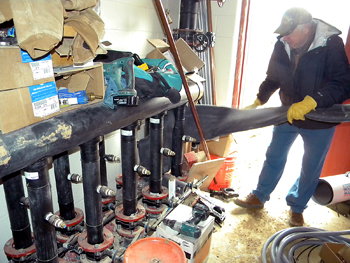The man who oversees the Moccasin Bend Sewage Treatment Plant was given a suspended misdemeanor jail sentence, probation and a fine this week in connection with a sewage spill last year that killed fish and fouled water at the Browns Ferry Marina.
Jerry Stewart, Chattanooga's director of waste resources, was charged with pollution of water in connection with the Aug. 6 spill of more than 100,000 gallons of raw sewage from a pump station into the bay beside the Browns Ferry Marina on the Tennessee River.
Tennessee Wildlife Resources Agency officer Bobby Brown said he cited Stewart because it wasn't the first such spill into the Tennessee River from the plant and TWRA must cite an individual, not an entity.
"He was the representative for the city of Chattanooga," Brown said.
He said if there are no further spills when the probation period ends, Stewart's record will be expunged.
"That's the close-out of this case. I'm just glad it's over," Stewart said Friday.
The spill happened when a lightning strike caused a power outage and idled a pump that carries sewage to the treatment plant. The spill killed 3,600 fish and forced live-aboard residents at the marina from their floating homes.
The sewage overflowed a manhole and ran downhill into the marina for 12 to 14 hours. It was the second major spill caused by electrical and pump problems in 2010. The first occurred in January when 130,000 million gallons spilled into the Tennessee River near Coolidge Park.
After the August spill in the marina, Stewart said workers were so busy getting the main plant back online after the lightning strike that they failed to notice the Lookout Valley pump station also was knocked out.
Hamilton County General Sessions Court Judge Bob Moon on Wednesday ordered Stewart to pay $788 to the TWRA as restitution for the dead fish.
He also fined Stewart $2,500 and sentenced him to 11 months and 29 days in the county workhouse. It was the maximum possible sentence and fine for the offense, Brown said.
Moon ordered the sentence suspended on good behavior and placed Stewart on probation for a year, according to court records.
Stewart said the city will pay the restitution and fine, totaling nearly $3,300.
That's only a drop in the bucket compared to the cost of cleaning the stagnant and bottlenecked bay after last summer's spill.
Under a state notice of violation from the Tennessee Department of Environment and Conservation, Chattanooga spent $44,000 on treatments, rental equipment and contractors to remove sewage and dead fish from the marina, Stewart said.
Dick Urban, head of the TDEC's water pollution control cq field office here, said the heat and stagnant water allowed the nitrites and microbes in the sewage to stew and consumed all the oxygen in the water, suffocating the fish.
"This is almost like a septic tank," Urban said in August of the polluted bay.
Normal water oxygen levels needed to sustain fish and other aquatic life is 5 milligrams per liter, but water in the marina five days after the spill tallied less than 1 milligram per liter at all water depths, Urban said.
TDEC regulators imposed specific requirements for a quick marina cleanup, and when those requirements were met TDEC did not issue a penalty, according to state records.
The U.S. Environmental Protection Agency and the U.S. Justice Department continue to probe Chattanooga's sewage and stormwater problems, according to city and federal officials.
"We're having meetings with them," Stewart said Friday of the federal agencies. "Other than that, I can't say anything about that."

